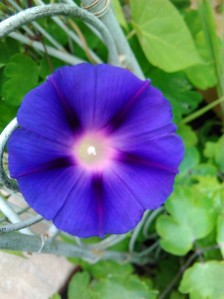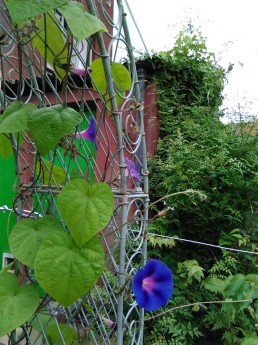“Stone walls do not a prison make
Nor iron bars a cage.”
wrote Richard Lovelace, back in the 1600s.
I’d sometimes wondered, passingly, how true that was. Could the human spirit rise above physical incarceration and fly free, despite all?
Life – considerate as ever – has given me the opportunity to find out. Not, I hasten to add, that I have been walled up in some dreadful prison cell. I’m free to come and go as I wish and my surroundings are clean, dry and comfortable. It is, nonetheless, a cell.
 I will be living, through the rest of spring and summer and well into autumn, in a square white room. There is a tiny shower room, but all other aspects of life must be accomplished here. Where once I had rooms, now I have corners – one for cooking, another for sleeping, an eating, relaxing and working area. Where once I had a garden to tend, stuffed with nodding daffodils, bluebells and tulips, I now have a single pot of hyacinths on a white windowsill. Where once I watched the sun set amidst distant hills across the Somerset Levels, now it drops below a tower block across the car park from the one I live in.
I will be living, through the rest of spring and summer and well into autumn, in a square white room. There is a tiny shower room, but all other aspects of life must be accomplished here. Where once I had rooms, now I have corners – one for cooking, another for sleeping, an eating, relaxing and working area. Where once I had a garden to tend, stuffed with nodding daffodils, bluebells and tulips, I now have a single pot of hyacinths on a white windowsill. Where once I watched the sun set amidst distant hills across the Somerset Levels, now it drops below a tower block across the car park from the one I live in.
My windows look out on to other blocks of flats. A hollow-eyed woman with dark hair sometimes peers out from the one opposite. A gaunt man coughs and gasps in the window as he drags at a cigarette from the room below hers. Beyond the blocks are housing estates on two sides and roads on the others.
Yes, it would be easy to sink into self pity in this sterile, soulless, monotone place. On my first night here, I lay in bed listening to the sound of traffic, far below, on the dual carriageway that leads to London – a soft, irregular swishing sound that rose to a crescendo and fell away again. It could almost have been taken for waves, breaking on a pebble beach, I decided, before noticing that this gave me no comfort at all. I’ve never much enjoyed the sea – too wide, too cold, too unpredictable.
I have with me the few comforts and essentials I was able to cram into a relative’s small hatchback and a few sticks of furniture I’ve borrowed, or bought from local second-hand shops. It’s a world away from my lovely cottage, my dear friends and my contented life over in the west.
So is my spirit broken by this cruel exile?
Slightly battered, perhaps, in these early days of readjustment, but far from broken. This has become an exercise in actively seeking out the positive. Since my arrival two weeks ago, a froth of may blossom has covered the narrow strip of wilderness – a haven for dog-walkers and fly-tippers – that separates the estate from the trunk road, so that I now barely see the lorries and vans hurtling towards the city. Tiny bluetits cling impossibly to vertical brick walls outside my window as they gather some form of sustenance from them. Beyond the flyover, a single green field can be glimpsed obliquely from one window, if I position my chair carefully.
The greatest help, though, has come from the two little children I have come here to be with. They and their mother have been permanently uprooted from their home, in the most traumatic of circumstances. They, too, are living in temporary accomodation nearby, but with no hope of returning to their home and friends. They have lost so much, yet they teach me, each day, about positivity and optimism.
“Grandma has a lake in her garden,” the six-year-old informed his mother, referring to the drainage ditch that crosses the small piece of grassland beside the flats.
Scale is unimportant. For us, now, it is a river, with meanders and tiny waterfalls created by twigs and leaf litter.
His three-year-old sister can easily spend ten minutes peering with total delight into a patch of wild violets she found there, stroking its petals reverently, or having earnest conversations with a passing beetle.
Even in my room, their imagination and creativity fills the space with magic.  A side table became an enchanted forest home for the fairies for a while.
A side table became an enchanted forest home for the fairies for a while.

A garden, bath and sofa were created in a box for their toys.
For all of us, now, Life insists that we build our own joys and delights and that we trust to its bounty and goodness to allow my little family to heal and rebuild their lives, so that I can ultimately return to mine.
I won’t be the same person who left, though. There is richness in this experience that will stay with me forever and I am deeply grateful for it.
 It was Mothers’ Day here yesterday. I say ‘here’ meaning the UK, because I know other countries celebrate it at other times. Our Mothers’ Day changes each year – something to do with Easter wobbling about, which is something to do with the moon, I think. Never really figured out what or why because it never really interested me that much. All I know is that it often more-or-less coincides with my birthday, which means my offspring tend to send me some sort of greeting on one or the other, but rarely both.
It was Mothers’ Day here yesterday. I say ‘here’ meaning the UK, because I know other countries celebrate it at other times. Our Mothers’ Day changes each year – something to do with Easter wobbling about, which is something to do with the moon, I think. Never really figured out what or why because it never really interested me that much. All I know is that it often more-or-less coincides with my birthday, which means my offspring tend to send me some sort of greeting on one or the other, but rarely both.




